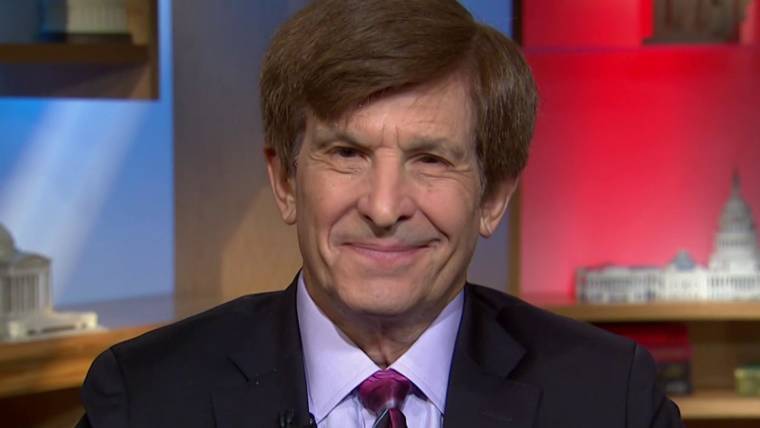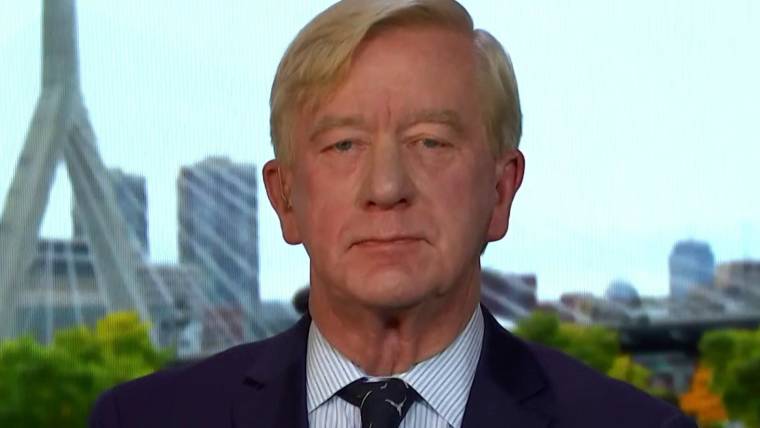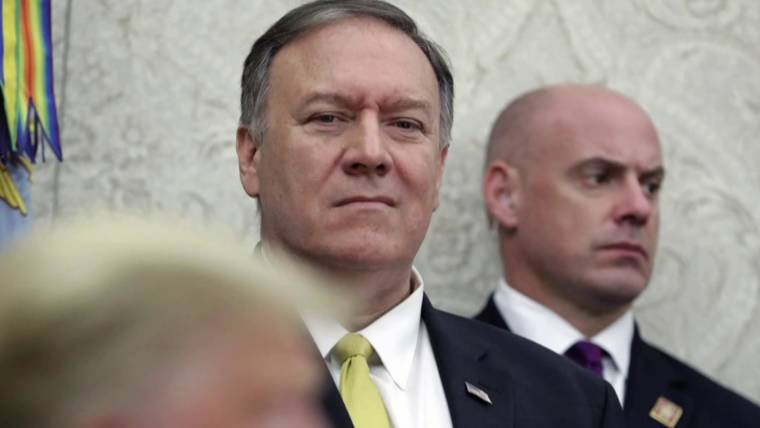Senate GOP support for Trump remains steady ahead of Week 2 of hearings
As the second week of the House’s public impeachment hearings begins, Senate Republicans are not wavering on their support for Trump.
Even as a number of witnesses appear to corroborate that Trump was personally involved in pushing for Ukraine to investigate his political rivals, and holding up military aid along the way, Senate Republicans still appear to be unwavering in their opposition to convicting the president if/when the case makes it to the upper chamber.
Senate Majority Leader Mitch McConnell, R-Ky., reiterated Monday in Kentucky that he expects to get the case, but that he does not expect the president to be removed from office. As we know, that would take 20 Senate Republicans to join every single Democrat to get the two-thirds majority needed to convict. That has never happened to a president in history, and looks unlikely this time around, particularly as the Senate trial will likely bleed into an election year.
And while most of the impeachment inquiry story lives in the House, Republicans have asked Sen. Ron Johnson, R-Wisc., for information about his interactions with the Trump administration involving Ukraine and the military aid that was held up. They sent that request in a letter to Johnson on Friday, which he mentioned on NBC’s “Meet the Press” on Sunday, and he’s working on a response (likely in writing.)
House investigating whether Trump lied to Mueller, lawyer tells court
The House of Representatives’ top lawyer told a federal appeals court Monday that the House is investigating whether President Donald Trump lied to special counsel Robert Mueller, and the attorney urged the judges to order the release of still-secret material from Mueller’s investigation.
Two of the three judges who heard arguments at the Court of Appeals for the D.C. Circuit — Judith Rogers, a Clinton appointee, and Thomas Griffith, an appointee of George W. Bush — seemed prepared to order at least some of the material sought by the House to be turned over.
House General Counsel Douglas Letter told the judges that the need for the still-secret material redacted from the Mueller report is “immense” because it will help House members answer the question, “Did the president lie? Was the president not truthful in his responses to the Mueller investigation?” in his written responses to the probe.
Read the full story here.
Pelosi gives impeachment update
House Speaker Nancy Pelosi, D-Calif., updated colleagues about the status of the impeachment inquiry in a letter on Monday.
In the letter, she says that the, “facts are uncontested: that the President abused his power for his own personal, political benefit, at the expense of our national security interests.”
Read the full letter below:
Dear Democratic Colleague,
As we enter this pre-Thanksgiving week, we must extend the Continuing Resolution to keep government open and advance our legislative agenda to meet the needs of the American people.
Thank you to the many Members who participated in our Speaker’s Meeting on Jobs. The presentation of the challenges facing America’s working families and the solutions presented by Transportation and Infrastructure Committee Chairman DeFazio and Energy and Commerce Committee Chairman Pallone helped advance our infrastructure legislation. The discussion on USMCA was constructive and will continue this week.
At the same time we legislate, we continue to investigate and litigate, as the impeachment inquiry proceeds.
Last week, the country was impressed by the valor and patriotism of the dedicated public servants and career diplomats, appointed by the President, in speaking truth to power. This week, we will hear from additional witnesses who will courageously expose the truth and defend our democracy.
The facts are uncontested: that the President abused his power for his own personal, political benefit, at the expense of our national security interests.
The weak response to these hearings has been, “Let the election decide.” That dangerous position only adds to the urgency of our action, because the President is jeopardizing the integrity of the 2020 elections.
There are also some who say that no serious wrongdoing was committed, because the military assistance to Ukraine was eventually released. The fact is, the aid was only released after the whistleblower exposed the truth of the President’s extortion and bribery, and the House launched a formal investigation.
None of us comes to Congress to impeach a President, but rather to make progress for America’s working families. However, our first order of business is our oath to support and defend the Constitution from all enemies foreign and domestic. As such, we are custodians of the Constitution and, For The People, defenders of our democracy.
Thank you for your patriotic leadership.
Trump tweeted as Marie Yovanovitch testified: Was it witness tampering?
Former U.S. ambassador Marie Yovanovitch was testifying Friday in the House impeachment inquiry when suddenly President Donald Trump weighed in.
“Everywhere Marie Yovanovitch went turned bad,” Trump tweeted. “She started off in Somalia, how did that go?” The president also asserted his “absolute right” to recall ambassadors, as he had done with Yovanovitch, whose most recent post was in Ukraine, a country at the heart of the impeachment inquiry.
Why it could be prosecuted as witness tampering
Federal criminal law contains a broad prohibition against illegitimately affecting the presentation of evidence in hearings. For example, it is unlawful to knowingly use intimidation or corrupt persuasion with intent to influence the testimony of any person in an official proceeding. An “official proceeding” includes hearings before Congress. Witness harassment also includes conduct intended to “badger, disturb or pester” and attempts to intimidate, even if the witness isn’t actually influenced, and even if the witness never actually received the threat.
McConnell says House impeachment timing could push Senate trial to 2020
Senate Majority Leader Mitch McConnell, R-Ky., suggested Monday that the House impeachment inquiry could last until the end of the year, which would push the start of the Senate process up against the Democratic presidential primary season.
“Well, all I can tell you at this particular point is it looks to me like the House is gonna be on this until Christmas,” McConnell told reporters at an event in downtown Louisville. He added, “Then it comes over to the Senate, it displaces all other business, the chief justice of the United States is in the chair, senators are not allowed to speak, they have to sit there and listen, and I’m not sure how long it will go on.”
If the House were to wrap up the impeachment inquiry on the timeline McConnell predicted, then the earliest the Senate would begin their trial would be in January, just weeks before the first votes are cast in the 2020 Democratic primary. McConnell said that he was confident that the Republican-controlled Senate would not vote to impeach President Donald Trump, and suggested that view might influence how long members would want to continue with the trial.
Schumer calls on DoD to protect whistleblowers, hand over Ukraine documents
Senate Minority Leader Chuck Schumer, D-N.Y., on Monday requested that the Department of Defense notify its personnel of their rights to make protected disclosures to Congress and halt any efforts to prevent officials from cooperating with impeachment investigators.
The request, in a letter to Secretary of Defense Mark Esper, comes ahead of public testimony Tuesday from Lt. Col. Alexander Vindman, a top White House expert on Ukraine, and Laura Cooper, a deputy assistant secretary of defense.
Vindman and Cooper “have been vilified and attacked by individuals in the media and elsewhere,” Schumer wrote. “Some have even gone so far as to call LTC Vindman, a recipient of the Purple Heart after being wounded while serving in Iraq, a spy and question his loyalty to the United States.”
Schumer added that he feared “these attacks will only increase after their participation in these public hearings.”
Schumer asked Esper to brief him the actions being taken to ensure that Vindman, Cooper and others are protected from workplace reprisals and for their personal safety. The minority leader also asked the department to “immediately cease any efforts to prevent officials from cooperating with Congress” and to hand over documents related to U.S. military aid to Ukraine.
House staffers on a summer trip to Ukraine learned U.S. aid was frozen. Stunned, here’s what they did next.
Two days after a whistleblower secretly filed a complaint about President Donald Trump’s dealings with Ukraine in August, two top congressional staffers arrived in Kyiv on a routine business trip that ended up setting off alarm bells on Capitol Hill.
The aides work for the Democratic leadership of the House Appropriations Committee, which is responsible for federal spending. They had been dispatched to make an on-the-ground assessment of the cash Congress has been pumping into former Soviet states — including Moldova, Georgia and Ukraine — to aid their defenses against Russian aggression.
But after traveling from Chisinau, Moldova, for two days of meetings and Ukrainian special-forces training observation in Kyiv and Berdychiv starting on Aug. 14, the staffers were shocked to learn from U.S. embassy officials that there was no new money coming into Ukraine, a congressional aide familiar with their trip told NBC News.
Read the full story here.
Secretary of state takes heat from Trump
Catch up on Article II: Tom Brokaw remembers Watergate
In a bonus Saturday episode of “Article II: Inside Impeachment,” NBC News special correspondent Tom Brokaw discusses his time covering the fall of President Richard Nixon and the parallels he sees to today.
Listen to that episode here.
And, in case you missed Friday’s podcast, we heard from national political reporter Josh Lederman, who discussed a long day of public testimony from ousted Ukraine Ambassador Marie Yovanovitch and the case each party is making to voters at this stage in the inquiry.
Listen to that episode here.














